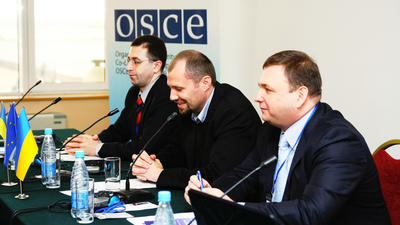-
Our work
-
Fields of work
- Arms control
- Border management
- Combating trafficking in human beings
- Conflict prevention and resolution
- Countering terrorism
- Cyber/ICT Security
- Democratization
- Economic activities
- Education
- Elections
- Environmental activities
- Gender equality
- Good governance
- Human rights
- Media freedom and development
- Migration
- National minority issues
- Policing
- Reform and co-operation in the security sector
- Roma and Sinti
- Rule of law
- Tolerance and non-discrimination
- Youth
- Field operations
- Projects
-
Meetings and conferences
- Summit meetings
- Review Conferences
- Ministerial Council meetings
- Plenary meetings of the Permanent Council
- Plenary Meetings of the Forum for Security Co-operation
- Security Review Conferences
- Annual Implementation Assessment Meetings
- Economic and Environmental Forum
- Economic and Environmental Dimension Implementation Meetings
- Human rights meetings
- Media conferences
- Cyber/ICT security conferences
- Conference of the Alliance against Trafficking in Persons
- Gender Equality Review Conferences
- Annual OSCE Mediterranean conferences
- Annual OSCE Asian conferences
- Partnerships
-
Fields of work
-
Countries
- All
-
Participating States
- Albania
- Andorra
- Armenia
- Austria
- Azerbaijan
- Belgium
- Belarus
- Bosnia and Herzegovina
- Bulgaria
- Canada
- Croatia
- Cyprus
- Czechia
- Denmark
- Estonia
- Finland – OSCE Chairpersonship 2025
- France
- Georgia
- Germany
- Greece
- Holy See
- Hungary
- Iceland
- Ireland
- Italy
- Kazakhstan
- Kyrgyzstan
- Latvia
- Liechtenstein
- Lithuania
- Luxembourg
- Malta
- Moldova
- Monaco
- Mongolia
- Montenegro
- The Netherlands
- North Macedonia
- Norway
- Poland
- Portugal
- Romania
- Russian Federation
- San Marino
- Serbia
- Slovakia
- Slovenia
- Spain
- Sweden
- Switzerland
- Tajikistan
- Türkiye
- Turkmenistan
- Ukraine
- United Kingdom
- United States of America
- Uzbekistan
- Asian Partners for Co-operation
- Mediterranean Partners for Co-operation
-
Structures and institutions
- Chairpersonship
-
Secretariat
- Secretary General
- Office of the Secretary General
- Conflict Prevention Centre
- Transnational Threats Department
- Office of the Special Representative and Co-ordinator for Combating Trafficking in Human Beings
- Office of the Co-ordinator of OSCE Economic and Environmental Activities
- Gender Issues Programme
- Opportunities for Youth
- Department of Human Resources
- Department of Management and Finance
- Office of Internal Oversight
- Documentation Centre in Prague
- Institutions
-
Field operations
- Presence in Albania
- Centre in Ashgabat
- Programme Office in Astana
- Programme Office in Bishkek
- Mission to Bosnia and Herzegovina
- Programme Office in Dushanbe
- Mission in Kosovo
- Mission to Moldova
- Mission to Montenegro
- Mission to Serbia
- Mission to Skopje
- Project Co-ordinator in Uzbekistan
- Closed field activities
- Parliamentary Assembly
- Court of Conciliation and Arbitration
- Organizational structure
- About us
Press release
OSCE and Council of Europe support development of mechanisms to prevent torture, ill-treatment in detention in Ukraine

- Date:
- Source:
- OSCE Project Co-ordinator in Ukraine (closed)
- Fields of work:
- Human rights
ODESSA, Ukraine, 2 November, 2010 - The Third East European Conference on national mechanisms to prevent torture and ill-treatment in detention, co-hosted by the OSCE Project Co-ordinator in Ukraine (PCU), started in the southern Ukrainian city of Odessa today.
The two-day event looks at challenges and practical aspects of the implementation of the Optional Protocol to the UN Convention against Torture in Eastern Europe and in the OSCE region as a whole. The protocol calls for the creation of national mechanisms to prevent torture in places of detention.
The conference focuses on the role of the civil society in the implementation process. The OSCE PCU will share its four-year experience in working together with Ukrainian authorities on establishing a system of civil monitoring in detention facilities across the country.
"The OSCE PCU supports and contributes to Ukraine's efforts to create an efficient national preventive mechanism in order to secure transparency, accountability and respect for human rights in detention facilities," said Rene BeBeau, Senior Project Officer at the OSCE Project Co-ordinator in Ukraine. "This is at the core of the OSCE commitments."
The OSCE PCU organized the conference jointly with the Council of Europe and the European Union as part of a programme on combating ill-treatment and impunity in South Caucasus, Moldova and Ukraine, as well as with the Kharkiv Institute for Social Research. Representatives of institutions dealing with human rights protection and torture prevention in Armenia, Azerbaijan, Belgium, Bulgaria, the Czech Republic, Cyprus, Georgia, Moldova, Poland, Russia, Ukraine and the United Kingdom are taking part in the conference, as are experts from the Council of Europe.
The meeting forms part of an OSCE PCU project to support Ukraine's work to prevent torture and ill-treatment in detention.